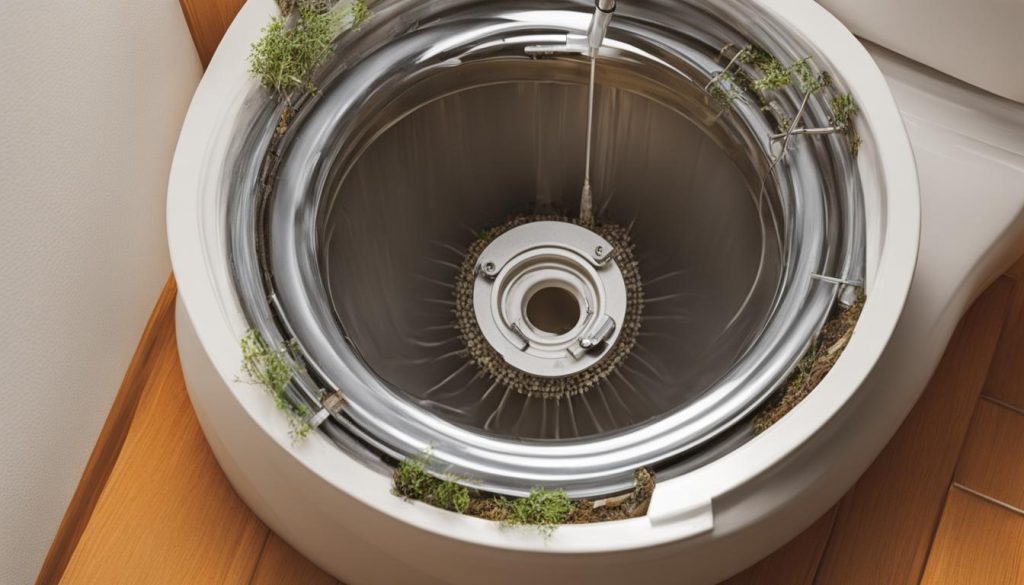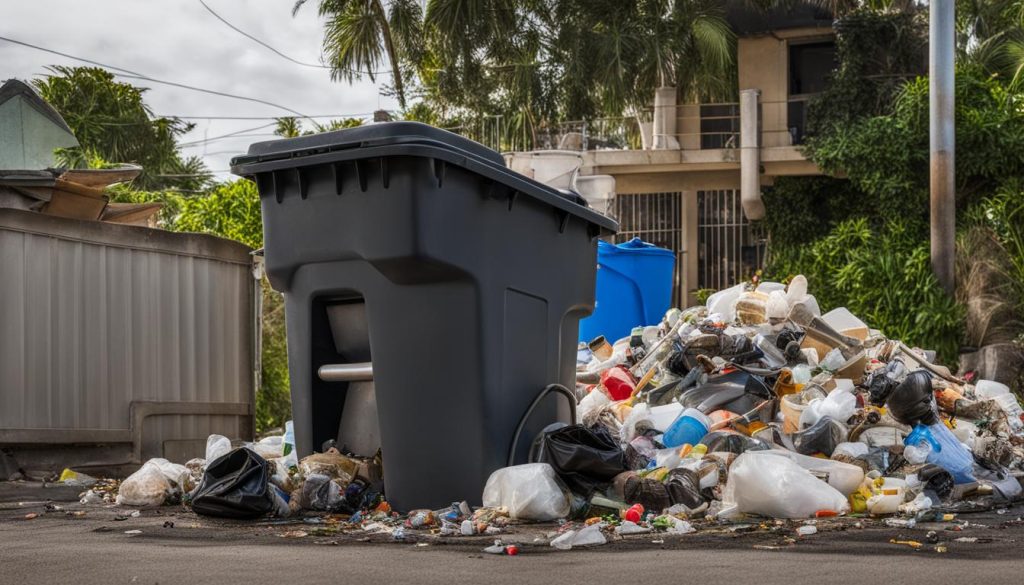Plumbing House Trap Essentials for Homeowners
Did you know that a malfunctioning house trap can lead to costly repairs and potential health hazards?
As a homeowner, it’s crucial to understand the importance of your plumbing house trap and the need for regular maintenance and repairs. The house trap plays a key role in preventing sewer gases from entering your home and ensuring the proper functioning of your plumbing system.
In this article, I will guide you through the essentials of plumbing house traps, including their function, maintenance, and common repairs. By familiarizing yourself with these essentials, you can keep your plumbing system in top shape and avoid unnecessary headaches in the future.
Key Takeaways:
- Regular maintenance and repairs are necessary to keep the house trap in good condition.
- A professional plumber should be consulted for annual or bi-annual inspections and necessary cleaning.
- Understanding the function and location of the house trap is important for its maintenance.
- Regular inspection and cleaning help prevent clogs and ensure optimal performance.
- Proper waste disposal is crucial for maintaining the health of your house trap.
The Importance of House Trap Maintenance
Regular maintenance is crucial to keep your house trap in good condition. As a homeowner, it is essential to understand the significance of maintaining your house trap to ensure the smooth functioning of your plumbing system.
House traps are prone to wear and tear over time, which can lead to blockages, leaks, and unpleasant odors. To prevent these issues, it is recommended to schedule annual or bi-annual inspections with a professional plumber who specializes in plumbing services. A professional plumber has the expertise and the necessary tools to evaluate the condition of your house trap and perform any necessary cleaning and repairs.
During the inspection, the plumber will check for any signs of damage, such as cracks or corrosion, that may compromise the integrity of the trap. They will also ensure that the trap is free from debris and obstructions that can hinder the flow of wastewater. Additionally, the plumber will inspect the pipe connections and seals to ensure a watertight fit, preventing any leaks or sewer gases from entering your home.
Maintaining your house trap not only prevents costly repairs but also protects the health and safety of your household. By hiring a professional plumber for regular maintenance, you can have peace of mind knowing that your plumbing system is in optimal condition.
So, don’t overlook the importance of house trap maintenance. Invest in professional plumbing services and ensure the longevity and efficiency of your plumbing system.
Benefits of House Trap Maintenance
Regular house trap maintenance offers several benefits, including:
- Prevention of foul odors caused by sewer gases
- Reduced risk of clogs and backups
- Prolonged lifespan of the house trap
- Improved overall plumbing system performance
- Enhanced safety and health for your household
| Signs that indicate the need for house trap maintenance: | Importance of professional plumber: |
|---|---|
|
|
Understanding the Function of a House Trap
When it comes to residential plumbing, the house trap plays a vital role in maintaining the integrity of your plumbing system. Also known as a sewer trap or sewer bend, the house trap is a curved pipe located near the point where your main sewer line exits your home. Its primary function is to trap debris and prevent sewer gases from entering your living space, ensuring the health and safety of your household.
By understanding the function and location of the house trap, you can better appreciate its importance and take the necessary steps to ensure its proper maintenance. With regular inspections and cleaning, you can avoid potential plumbing issues and keep your home’s plumbing system in optimal condition.
House Trap Location
The house trap is typically situated underground, near the foundation or basement of your home. It is strategically placed at the point where the main sewer line exits your property, ensuring that any wastewater flows through it before entering the municipal sewer system.
In some cases, the house trap may be located just outside the foundation wall of your home or in a utility area. It is essential to know the exact location of your house trap, as it enables easier access for inspection and maintenance purposes.
While the location may vary based on the specific plumbing setup of your home, a professional plumber can help you identify the precise position of your house trap for regular maintenance and any necessary repairs.
Now that we have a better understanding of the function and location of the house trap, let’s explore the importance of regular inspection and cleaning to ensure its optimal performance and prevent potential plumbing issues.
Regular Inspection and Cleaning
Regular inspection and cleaning are vital for maintaining the optimal performance of your house trap. It is crucial to prevent clogs and remove accumulated debris that can obstruct the flow of wastewater. Hiring a professional plumber for this task ensures a thorough assessment of the trap’s condition and the use of specialized tools for effective cleaning.
The Importance of House Trap Cleaning
House trap cleaning plays a crucial role in preventing plumbing issues and maintaining the integrity of your sewer system. Over time, debris, such as hair, soap scum, and food particles, can accumulate in the trap, leading to blockages and unpleasant odors. Regular cleaning helps prevent these problems and ensures the smooth flow of wastewater.
During the inspection process, a professional plumber will visually examine the house trap and check for any signs of damage, corrosion, or blockages. They may also utilize specialized tools like drain snakes and hydro-jetting equipment to remove stubborn debris and restore proper functioning.
Cleaning the house trap at regular intervals, such as every year or every two years, is highly recommended. This frequency may vary depending on factors such as the age of your plumbing system, the number of occupants in your home, and your usage patterns.
By investing in routine house trap cleaning, you can prevent costly repairs and ensure the longevity of your plumbing system. Additionally, regular cleaning contributes to a healthy and hygienic living environment by eliminating the risk of foul odors and sewage backups.
Remember, prevention is always better than a cure when it comes to plumbing issues. Regular inspection and cleaning of your house trap go a long way in maintaining the efficiency and longevity of your plumbing system.
| Benefits of Regular House Trap Cleaning |
|---|
| Prevents clogs and blockages in the wastewater flow |
| Eliminates unpleasant odors caused by accumulated debris |
| Reduces the risk of damage and corrosion to the house trap |
| Preserves the integrity of your plumbing system |
| Improves the efficiency and performance of your sewer system |
Responsible Waste Disposal
Proper waste disposal is essential for maintaining the health and functionality of your house trap. By following proper plumbing practices, you can avoid potential clogs and blockages that can disrupt your plumbing system.
When it comes to waste disposal, it’s important to remember that not everything should go down the drain. Flushing non-biodegradable items down the toilet or pouring grease, oils, or food scraps down the sink can lead to serious issues, including clogs in your house trap.
Educating your household members about responsible waste disposal is crucial in preventing unnecessary stress on your house trap. Encourage everyone to follow these best practices:
- Dispose of non-biodegradable items such as wipes, diapers, and feminine hygiene products in the trash, not the toilet.
- Pour cooking grease or oils into a designated container and dispose of it in the trash.
- Use sink strainers to prevent food scraps and solids from going down the drain.
By adopting these responsible waste disposal practices, you can protect your house trap from potential damage, reduce the risk of clogs, and ensure the efficient operation of your plumbing system.
Visual Representation:
| Non-Biodegradable Items | Proper Disposal Method |
|---|---|
| Wipes, diapers, and feminine hygiene products | Dispose of them in the trash |
| Cooking grease or oils | Pour into a designated container and dispose of it in the trash |
When to Seek Professional Assistance
If you notice any signs of a malfunctioning house trap, it is crucial to seek immediate professional assistance to prevent further damage to your plumbing system. A licensed plumber possesses the expertise and experience required to promptly identify and resolve issues related to house trap repairs.
Some indications that you may need to call a licensed plumber for house trap repairs include:
- Slow draining sinks or toilets
- Unpleasant smells coming from drains or pipes
- Gurgling noises in plumbing fixtures
These symptoms may indicate a blockage, damage, or malfunctioning of the house trap. Attempting to fix such issues on your own without proper knowledge and equipment could worsen the situation and lead to costly repairs.
By reaching out to a licensed plumber, you can benefit from their professional emergency plumbing services. They will conduct a thorough inspection of your house trap, diagnose the problem accurately, and undertake the necessary repairs to restore the proper functioning of your plumbing system.
Remember, timely intervention by a licensed plumber can save you from extensive damages and potential hazards associated with a malfunctioning house trap. Don’t hesitate to contact them whenever you suspect an issue with your plumbing system.
Let the experts handle your plumbing emergencies, so you can have peace of mind knowing your house trap repairs are in capable hands.
Essential Plumbing Tools for Homeowners
As a homeowner, it’s important to have a basic plumbing tool kit readily available. With the right tools at your disposal, you can confidently tackle common plumbing repairs and projects without having to call a professional. Here are some essential plumbing tools every homeowner should have:
- Sink auger: A sink auger, also known as a drain snake, is a flexible cable tool used to remove clogs from sinks, bathtubs, and shower drains.
- Toilet auger: A toilet auger is specially designed to clear clogs in toilets. It has a longer handle and a flexible cable that can navigate the curved trap to remove blockages.
- Pliers: Pliers are versatile tools that can be used for a wide range of plumbing tasks. They come in various types, such as slip-joint pliers for gripping and turning nuts, and tongue-and-groove pliers for gripping pipes and fittings.
- Wrenches: Adjustable wrenches and pipe wrenches are essential for loosening and tightening nuts, bolts, and pipes. They provide a firm grip and leverage for plumbing repairs.
- Screwdrivers: A set of screwdrivers, including both flathead and Phillips head, will come in handy for loosening or tightening screws on faucets, valves, and other plumbing fixtures.
Having these tools readily available in your home tool kit will enable you to address plumbing issues promptly and efficiently. They are not only cost-effective but also give you the satisfaction of being able to handle small plumbing tasks on your own.
With the right tools and a little know-how, you can become a DIY plumbing enthusiast and take care of minor plumbing repairs and maintenance tasks in your home. However, it’s important to remember that major plumbing issues should always be handled by a professional plumber.
Replacement Parts for Plumbing Fixtures
When it comes to maintaining your plumbing fixtures, having replacement parts readily available can save you time and money. Leaky valves are a common issue that can be easily fixed by using items like faucet packing, rubber washers, and O-rings. These small but crucial components can help restore proper functionality to your fixtures.
For more specific repairs, having the right tools can make a significant difference. Tools like a faucet valve-seat wrench and tubing cutter can be invaluable when working with specific fixtures. These specialized tools allow you to make precise adjustments and repairs, ensuring a professional-looking result.
Supporting local plumbing supply houses is not only convenient but also a great way to contribute to your community. When purchasing replacement parts and materials, consider visiting your nearest plumbing supply store. Not only do they offer a wide selection of high-quality products, but they can also provide expert advice to help you find the right replacement parts for your specific plumbing fixtures.
Source Links
- https://home.howstuffworks.com/home-improvement/plumbing/plumbing-basics-ga.htm
- https://www.thespruce.com/plumbing-tools-1824860
- https://www.allserviceprofessionals.com/house-trap-maintenance-essential-tips-for-a-healthy-plumbing-system
- Investing Wisely: How Windows & Doors in Boost Property Value and Financial Health - April 24, 2025
- The Financial Impact of Personal Injuries: Why Legal Help Matters for Business Owners - April 16, 2025
- The Hidden Financial Costs of Domestic Assault: What Business Owners Need to Know - April 16, 2025













